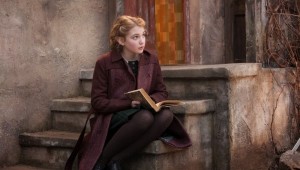History Repeating Itself
A couple of positive reviews last fall of The Book Thief had me interested in taking in the film during a spate of interesting movies that hit theaters in the pre-Christmas time frame.
Although we failed to make it during its initial theatrical run, the bonus behind today’s rapid DVD release cycles means that just eight months later it appeared on the public library’s shelves.
The wait was well worth it. Every so often you see a film and marvel how it failed to win the Best Picture Oscar. While it garnered Academy Award and Golden Globe nominations for its score, to me that’s like applauding the cheese while ignoring the mouth-watering burger on which it sits.
A Captivating Film

The Book Thief tells the story of Liesel, a nine-year-old girl in 1939 who goes to live with a German couple after her mother is unable to care for her two children. En route to her new home, Liesel’s young brother dies. At his grave, she grabs her first book, The Grave Digger’s Handbook, apparently left behind by a newcomer to the craft.
Although unable to read, Liesel keeps the volume. Hans, her foster father, uses it and others to teach her to read. Later, when the girl takes her foster mother’s washing load to the mayor’s house, his wife invites her into the family library, stuffed with books.
After Liesel’s foster mother gradually loses all her customers—ostensibly because the family isn’t supportive enough of the Nazi Party—Liesel rebels by returning to the mayor’s house to steal books. Books she had stopped reading in fear the Nazis would catch her with forbidden volumes.
Repaying a Favor
Also central to the story is Liesel’s foster parents taking in Max, a Jew forced into hiding by the increasing hostilities. During World War I, Max’s father had saved Hans’ life. Now, despite the enormous risks, Hans insists on repaying the favor.
The relationship Liesel forms with Max, including a scene where the pair ridicule Hitler amid mocking “Sig Heil!” salutes, is one of the film’s many shining movements.
Despite the sadness that ensues after Max is forced to flee the family’s basement, the teaching quality of The Book Thief (the original novel a New York Times bestseller for more than four years) is one parents should share with older children.
Providential Viewing

During our discussion, he mentioned visiting the Ukraine last January and seeing flyers repeating the same kind of preposterous claims circulated by Nazis and others before and during World War II.
“It’s hard to believe this is happening in the 21st century,” he said, noting the same lies are spread in the Middle East and other parts of Europe. “Such anti-Semitism is not just coming from neo-Nazis and Arabs, but people Jews see as (representing) the church.”
Spanish philosopher and author George Santayana is widely known for his remark: “Those who cannot remember the past are condemned to repeat it.” It would seem that much of today’s world has forgotten the lesson taught by Nazi Germany. It’s enough to make any book lover cry.


